-853X543.jpg)
HIDAYAT SAMI: Spotlighted!
by Aparajita Krishna June 23 2022, 12:00 am Estimated Reading Time: 20 mins, 32 secsIt’s Hidayat Sami who Aparajita Krishna meets today to explore his vast repertoire as an actor, director, light-designer, playwright and producer.
Hidayat Sami’s tall, towering, impressive presence contains a very gentle bearing. He also has a catwalk personality. The talk herein will also tell us of his very interesting ancestry and their links with our cinema since the silent film era. Anyone who frequents Prithvi Theatre in Mumbai would have more than noticed Hidayat. You have to literally and figuratively look up to him. This theater-man is an actor, director, producer, playwright and a very respected and solicited creative Light-Designer. Since 1991 he has been a lighting-designer on stage and a theatre man at large. Till date he has done 192 plays and in seventy percent of them he has designed the lights.
Among the many reviews on Sami’s work the one in Verve on Theatre Arpana’s play Loretta says, “Enhancing the real look further is the lighting by Hidayat Sami, who magically transforms the stage; from being sunlit, it moves on to a soft evening scene and then a pretty night setting.”
Hidayat means the one who gives instruction. Also, one who shows the way. We get talking.
As a theatre person you willy-nilly incorporate the attributes of your name. How would you assess your creative journey up till now?
My creative journey has been a very fulfilling one. It is now almost 31 years. I was fortunate enough to get associated with all the right people right in the beginning when I was starting out. They helped educate and mold me into what I am today.
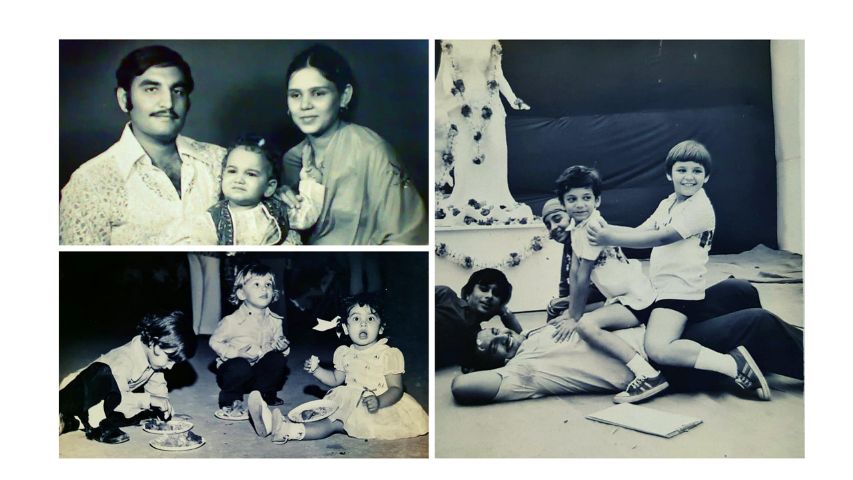
Let’s start in the present and then flashback. In June 2022 what are the professional assignments (plays, films, serials) that occupy you? Saw the link of your offline and online workshops along with Trishla Patel, Acting Ka Keeda.
Right now, I am busy with my play Guldasta, which is a collage of short stories. Eighty-percent of the actors are new, or, first timers on stage. It is an ongoing project and we keep adding stories and new actors to it. Other than that, I am busy with a Bollywood musical, Balle Balle, which is now a resident show on the Cordelia Cruise ship Empress. Our workshops, Acting Ka Keeda, will be starting soon at Prithvi. And of course, I’m always planning new shows, as in plays and doing shows of the ongoing ones. Also, I plan to direct a film soon.
Are there plays in which you have also acted and designed the lights with someone else operating for the shows?
Yes. Pereira Bakery, All About My Mother, Mystery Of The Pantomime Cat and some shows of Snapshots from an Album.
Prithvi Theatre in Mumbai is like your extended-home. Since 1992 you have been closely associated with the annual Prithvi festival. You regularly help with the planning, programming and running of the Prithvi Theatre Festival in Mumbai. Give words to your association.
I attended my first workshop with Dubeyji (Satyadev Dubey) at Prithvi. And was completely fascinated and taken in by the space. I have not had any formal education in lighting or acting. Most of what I have learnt is by observing on the job at Prithvi. I first joined as a volunteer in the Prithvi Festival. I completely fell in love with the hectic activity, the hustle bustle, the creativity, the camaraderie. The fact that this entire army of people comes together to make the festival happen was fascinating. I am still fascinated by it even now after all these years and have decided that I am going to be a part of it lifelong. Kunal Kapoor does the programming. I only help in executing. It feels great. It is my high.
Has the keeda of the Corona pandemic given a new dimension to the theatre-bug, as it is to be performed and viewed?
The only difference I find is that the attention span of audiences has been affected. They prefer shorter shows. Otherwise, it’s pretty much the same.
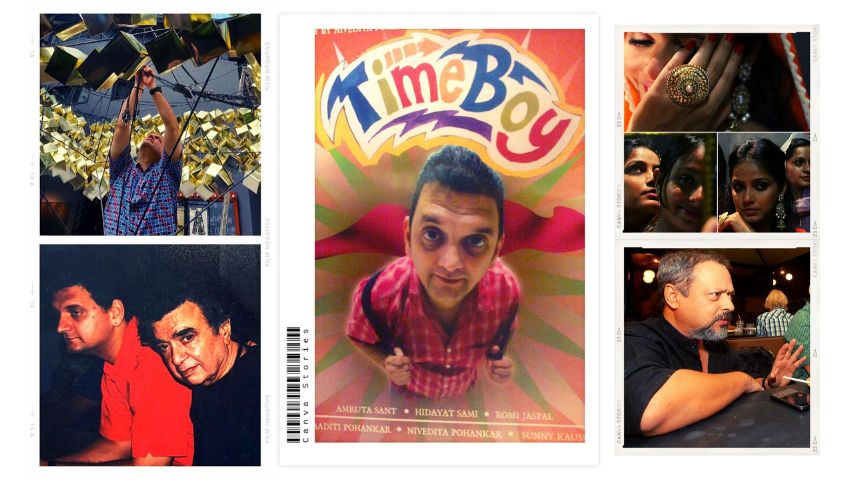
Has the internet opened theatre to the world-audience at large? Has the footprint grown? Do the technicalities of a production hence matter more?
Yes, it has. People now have access to performances around the world and that has forced us to up our game if we want to stay relevant. Theatre groups now take light design, sound design, projection, graphics very seriously.
In March 2022 you staged Guldasta, a production with 14 short stories including Khol Do and Shaljam by Saadat Hasan Manto, Kamleshwar’s Circus, and Harishankar Parsai’s Do Naak Wale Log. These were a few from a select line-up of stories. You were the director of this production/stage creation. Tell us about it.
Guldasta came out of our acting workshop at Prithvi. We suddenly had a lot of actors who had worked very hard and were eager to perform. It is a collage of short stories. Since we had a lot of people whom we wanted to incorporate we decided on this format. Prithvi was kind enough to give us the opportunity to perform.
Now to the beginnings and the sequence. My search on the internet gave me access to quite a lot of information about your work, but not much about your familial background. So, I want to ask you to share a little gist of your familial background. Inayat, your brother, is also a lighting designer, actor, director? I also gather that your father Khalid Mohammed is the brother of actress Farida Jalal. True?
I was born and brought up in Mumbai. I grew up in a family that had its roots in the commercial Hindi film industry. As a child/young adult I used to play badminton with Mr. Dilip Kumar. We were family friends. My grandmother on my dad’s side acted in silent films. My dad’s sister, Farida Jalal still acts. My dad has assisted movie greats like Raj Kapoor, V. Shantaram, A. Salaam, Sultan Ahmed. He is now a writer, producer and director. My maternal grandmother o and my mother and her sister acted as junior artists in several movies in the nineteen-sixties. They were Anglo-Indian. I grew up around movie sets and watching a lot of movies. I went to school in Bandra, Saint Annes on Pali Hill. College was Rizvi College. Inaayat my brother is also an actor, light designer, sound designer and director.
Here is an interesting titbit: My Dadi was an Iraqi and my Dada was a Punjabi from Pakistan. He came here during the partition. My Nani was a proper Britisher and my Nana was from Kolkata. I am hybrid.
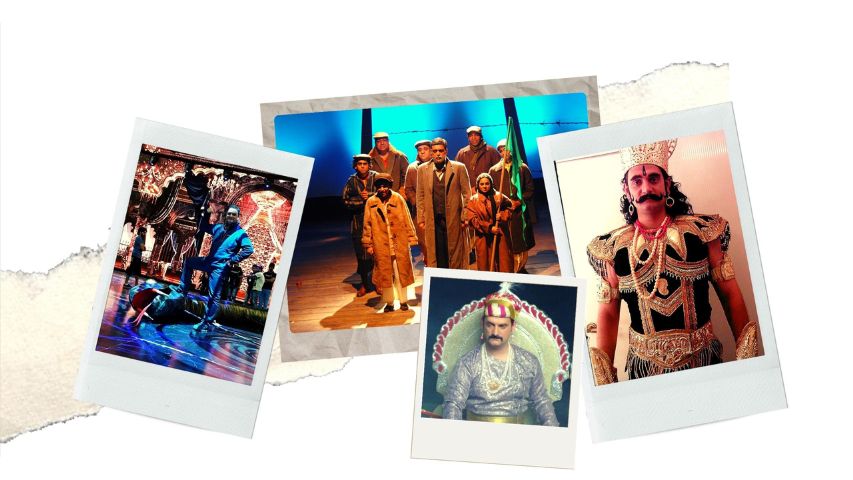
Was theatre an active part of your immediate familial background, or not really?
Acting was but not theatre. Inaayat and I are the first from our family who are so active in theatre. There is one more thing that nobody in the theatre industry knows about me and I would like it to come out in this interview. I come from a film background. Somewhere around 1990-1991 things had been set up for me to be launched as a lead in a Hindi feature film, which was going to be directed by my dad. I had gone through the usual training of acting workshops with a gentleman called T S Thapa. Bodybuilding etc. But things didn’t work out for my dad. That film did not get made. I was heartbroken. That time only Naseeruddin Shah introduced me to theater. Theater was my solace. My go-to. In a lot of ways theater has helped me get over that, put that behind me and move on and do things here.
When me and my brother came into the theater, we really had a tough time. Because we came from a very different background. It wasn’t like a walk-in for us. There wasn’t an acceptance immediately. There was a lot of resistance and opposition. But people like Satyadev Dubeyji and Shishir Sharma, Sunil Shanbag, Vinod Ranganath were the ones who constantly supported both of us. They constantly encouraged us.
In the beginning it was a process of having to prove yourself again and again and again. We just dug our heals in and sunk our teeth in, stuck there and kept working, and kept working. Finally, everybody accepted us. That felt wonderful. This is one of the main reasons why I love working with youngsters and with new people. People who walk into Prithvi for the first time really don’t know who to go to? Who to talk to? Who will give them the time of the day and explain to them how things work? I decided to be that person for as many people as I can. I know it was damn tough for me. That has also shaped my outlook in theatre.
Your creative journey started as an actor in theatre. Can you recall your first acting assignment? Could be in school, college?
My first acting assignment was in an elocution competition in school. I did Brutus’s speech from Julius Caesar. I remember my knees knocking on stage. I did not do any theatre in college. I did science and was a complete bookworm.
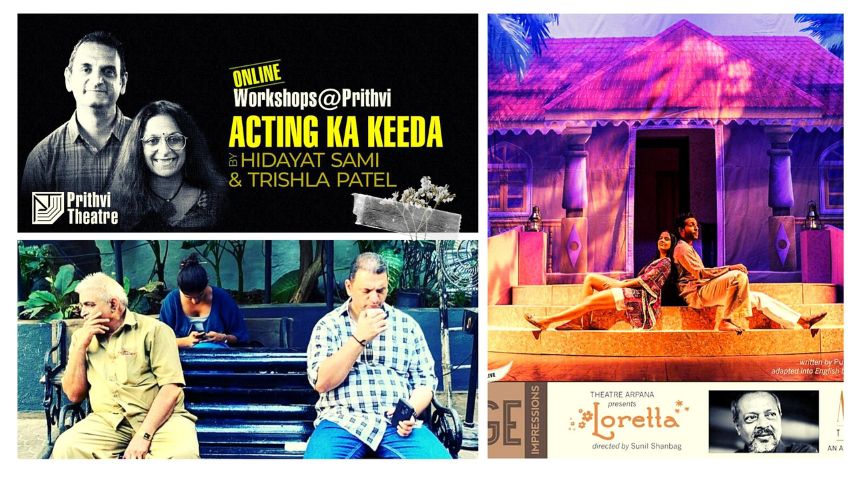
You are quoted saying, ‘I started acting with Naseeruddin Shah in ‘Julius Caesar’ and he sent me to Dubeyji, with whom I remained till he passed away. I used to attend his workshops and assist him. Then I went with Naseerbhai to the National School of Drama as his assistant and watched him at work.’ Which years?
Nasser sent me to Dubeyji in 1991. I went with Naseer to NSD in 1994-95.
You have acknowledged Satyadev Dubey as your teacher. Can you recall your first meeting with him? Most people have a story hidden therein.
My first meeting with Dubeyji was not a pleasant one. I remember I went to Prithvi on the morning of the workshop and he asked me if I had memorized the passage for the workshop. I had not because I did not know that I had to memorize anything. I told him and he yelled at me and asked me to either learn it or leave. I guess the yelling really upset me, but I decided to stay back at the workshop. Naseer had given me a heads up about Dubeyji. I also felt that if someone like Naseer has asked me to get into the workshop, come what may, there must definitely be something in the guy (Dubeyji). I learnt the passage in 10 minutes and went to the workshop. Dubeyji noticed that and the rest is history.
Another quote from you: “Dubeyji told me I could not always get what I wanted as an actor, so I should do lighting and get better by observing actors. I found that I also had a flair for it and got a lot of work.”
Yes, this is completely true. Dubeyji asked me to start lighting so that I could continuously observe actors and Sunil Shanbag trained me. I learnt a lot while working with Sunil. Also, I would like to mention Baghu from Prithvi Theatre, who would let me come on the catwalk while he was focusing lights for a play and would explain to me what each light did.
As an actor, director, light-designer you learnt on the job, or, also took institutionalized training? NSD had/has a 3-year course for light-design.
I had already started working in the professional theatre so I decided to stay here and learn on the job.
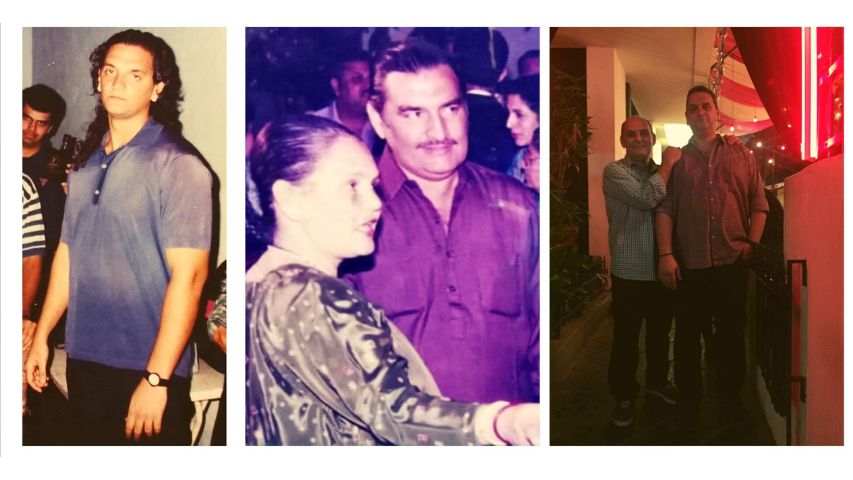
Who were the people whose works you admired in acting, films, theatre?
I will be really honest. I grew up on commercial Hindi films. Dilip Kumar and Amitabh Bachchan are responsible for getting me interested in acting. Then I was fortunate enough that Naseer came into my life and I got a very different view of acting. In films I have always admired the two gentlemen I have mentioned. I am also a big fan of Raj Kumar Hirani. In theatre the list is endless but Satyadev Dubey, Sunil Shanbag, Naseeruddin Shah, Ratna Pathak Shah, Neena Kulkarni, Sonali Kulkarni, Nagesh Bhonsale, Nadira Babbar, Rajit Kapoor, Shernaz Patel to name a few.
Sunil Shanbag initiated you in backstage work? Were you good at it?
Yes, he did. Production work. In one of his productions of Cyclewala. I was quite good at it.
In theatre light-design who do you look up to in India and internationally? Tapas Sen is, of course, iconic in our part of the world.
Tapas Sen most definitely. Also, Sunil Shanbag, Sam Kerawala. Among the younger lot I like the work of Arghya Lahiri, Yael Crishna, Gurleen Judge, Pushan Kripalani, Becket Joseph to name a few. Do not really know much about international designers.
It is said that before Dubey passed away he bequeathed his theater group, Theatre Unit, to you. It is a very precious inheritance. Obviously not in the sense of revenue, or, as an active group in the present, but as a creative sense of inheritance. Right?
Yes, it is true. It happened in Arogya Nidhi hospital. Dubeyji told me that he did not have anything to give me, but his theatre group. That I should helm ‘Theatre Unit’ in the future. I was overwhelmed. It is a huge responsibility. I managed a few productions after he passed away. I hope he approves of them from wherever he is. I hope I brought a smile to his face.
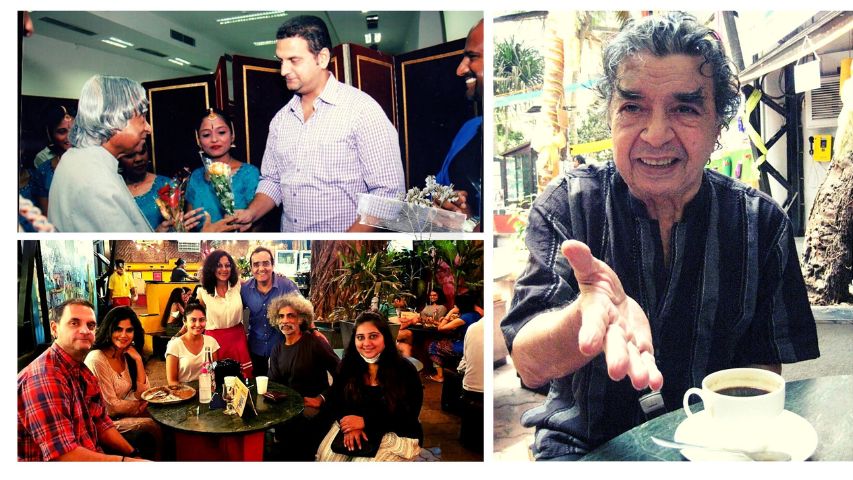
You have worked with Feroz Khan, Makarand Deshpande, Ramu Ramanathan. In some capacity or the other you have also worked with Lillete Dubey, Aakash Khurana, Rahul Da Cunha. As an actor, director, producer, light-designer you have been part of over 175 productions across Hindi, English, Marathi? Do substantiate this and add what you want to.
Wow! I have been around for close to 30 years. Now that would be a lot of substantiating. All I would like to say is that I have learnt a lot from all the people you have mentioned, in some cases I leant what not to do. Those learnings have shaped me and made me what I am. I consider myself really fortunate and lucky to have worked with so many talented individuals.
You have designed lights for productions like Hamlet, Sir Sir Sarla, Dear Liar, Vagina Monologues, Stories In A Song, Dreams Of Taleem among a host of others. Would it be fair to ask you to pick your favourite work?
Hamlet Directed by Neeraj Kabi and Dreams Of Taleem And Walking To The Sun by Sunil Shanbag. Blackbird by Akarsh Khurana.
As an actor your play-list significantly includes Striptease, Snapshots From An Album, Irani Café (you did 4 parts), Mahatma versus Gandhi, Timeboy, The Doll, The Boy Who Stopped Smiling, Cotton 56 Polyester 84, to name a few. You also acted in Purva Naresh’s Aaj Rang Hai (2021). Do add what you want to. Did you learn acting by observation and on the job?
I did do a few workshops when I started out, but have learnt mostly on the job. Dubeyji once told me, ‘Acting cannot be taught, but it can be learnt.’ That made a big impression on me. I may not have done a lot as an actor, but I am really proud of whatever acting work I have done so far.
In your repertoire are also mentioned plays like Magic Pill (written-directed by Dubey & produced by Sami), The Cane Mutiny Court Martial (directed by Naseeruddin Shah), Cyclewala (directed by Sunil Shanbag), The Boy Who Stopped Smiling (directed by Ramu Ramanathan) and Mahatma v/s Gandhi (directed by Feroz Khan), The Doll (produced by Sami), Medha Aur Zoombish (produced by Sami). Do specify the capacities you were involved in?
I have acted in all of the above productions. In some like Cyclewala, Mahatma vs Gandhi I also handled production. In Caine Mutiny Court Martial I operated sound in the shows I did not act in.
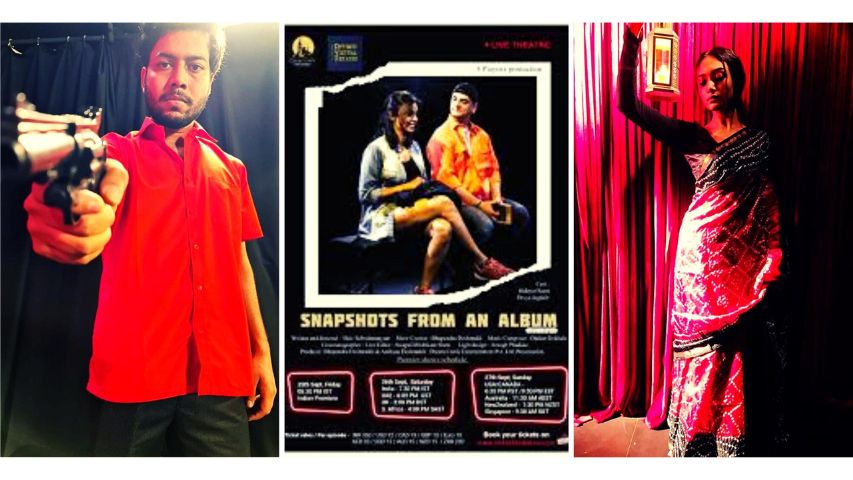
As a theatre-director your works include All About Women (starring Nimrat Kaur, Malaika Sheny, Shivani Tansale, Ratnabali Bhattacharya, Prerna Chawla, Tahira Nath, Tejaswini Kolhapure), Umrao, Peter Pan, Classic Milds, Jaan E Jigar, Balle Balle,Medha And Zoombish, Abhi Na Jaao Chhod Kar. All About Women was nominated at META in several categories including best director and best play?
Yes, that was quite a high. All About Women was the first play that I had directed. Really grateful to Akarsh Khurana for producing it and Dubeyji for introducing me to Miro Gavran.
Umrao (2013) was a play directed by you and adapted from the book written by Mirza Muhammed Hadi Ruswa. Tell us about the production. Neetu Chandra played Umrao. Music was by Rekha Bhardwaj. How did you interpret the story?
Umrao was adapted from the original novel by Purva Naresh who also produced the play. The idea was to expose people to the actual lives of courtesans of the yesteryears and not present it like they do in the movies. Rekhaji (Bhardwaj) was kind enough to do the music for us and train some of the actors.
How does direction stand apart from say acting and light-design?
So, the actor and the light designer paint the picture, given to them by the director, with their respective skill sets. The director is the guy who creates the picture that is to be painted. That is the best way that I can explain it.
As an assistant-director for feature films and tele-series you have worked on Nargis (directed by Khaalid Muhammad) and Krishna Arjun (directed by Shailendra Shukla). Is it so?
Yes, it is. I had assisted in three feature films and one television serial before I started doing theatre. In fact I remember very clearly that I started giving the clap in one of my dad’s films when I was in the seventh standard. During summer vacations.
You have modeled for products like Taj Mahal Tea, Aquaguard. And also worked as a dubbing artist. Do update us. Your carriage makes for a very good model too.
I had great fun doing these. I would love to do more, but unfortunately the entire audition process puts me off. It’s a lot more professional now, but I remember I once walked into an audition and was told, ‘You are a theatre actor right? Do something and we will record it.’ That really put me off. I left. I have also given up a lot of camera work for the stage.
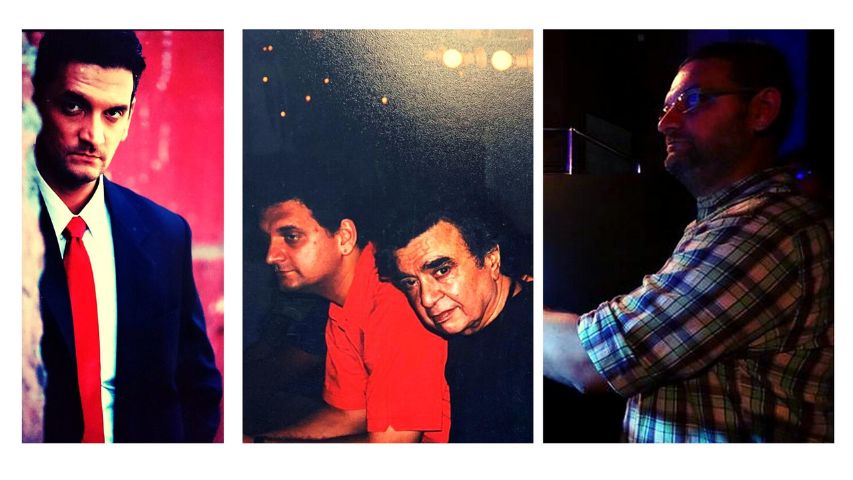
You have been involved in conducting acting workshops for youngsters. How do you assess the young artists and technicians in the making?
Dubeyji used to say that one must always teach/share one’s knowledge and that by doing so you keep brushing up on your own basics and skill. I love working with younger actors and technicians. Although I feel most of them are in a tearing hurry to achieve. I ask them all to calm down and not worry. Just keep working hard 100% and the rest will follow.
As a lighting designer you have travelled the world, most significantly with Astad Deboo. You must have worked across grand world theatre venues to people’s homes. Any special recalls? I read that once in Indonesia the computerized lighting board blew up and you were the only one who knew how to operate a manual board.
Thanks to Astad I have performed on all the continents in the World. I have been to places like Equador, Peru, Sao Paulo, and performed in some fantastic theatres. Working with Astad taught me how to think on my feet and adapt because we performed in a variety of spaces. We were in Indonesia for a show and their programmable board stopped working. I mainly like working with a manual board since I like to keep improvising. Up until then a lot of the guys had made fun of me, but when the show was going on I had about 6-7 lighting operators standing behind me to watch how I operated. It was fun. Now I use both programmable and manual boards.
In 2018 you are quoted saying that the musical ‘Jaan-e-Jigar’ at Bollywood Park, in Dubai, is the biggest staging you have done. It was for Wizcraft. You then went on to do another mega technological production - Balle Balle for Wizcraft. Do elaborate.
In 2016 a team from Wizcraft came and saw my play Umrao. The next day I was called in for a meeting and asked if I would like to be a part of the Musical Jaan-E-Jigar. I had never done anything like that so I said sure I would like to give it a shot. They sent me to Delhi to watch Zangoora. I was blown away. I got back the next day and said I was on. Then I met Viraf Sarkari at rehearsals. I have learnt a lot from him about staging and scale. He is probably the best in India when it comes to scale.
Jaan-E-Jigar was big. It had set pieces in it that weighed a ton each. The entire team of actors, dancers, technicians, production and backstage were about 300 people. It was a great experience. I wish we could have done it in India. Nothing like it has ever happened here. I was the drama and staging director on it.
After Jaan-E-Jigar I was asked to be drama director on Balle Balle, which was a wedding musical produced by Wizcraft. We ran the show for three months (everyday) in Mumbai and then for three months (everyday) at Kingdom of Dreams. Right now, Balle Balle is the resident show aboard the Empress Cruise Ship. Both these shows were quite an experience for me. Up until now I was always told to keep budgets tight, but here it was completely opposite. We could get whatever we wanteded for the show.
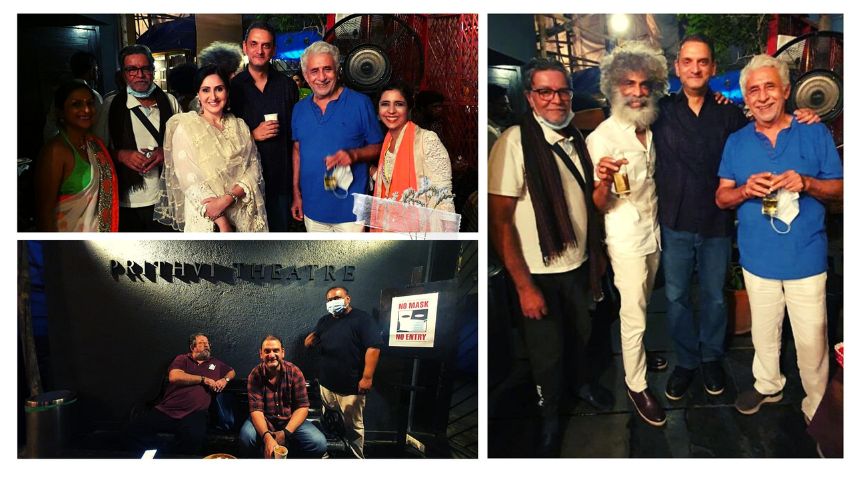
How equipped is the Indian theater for technical extravaganzas? I learned that for a production like ‘Mughal-e-Azam,’ the technical experts came from the West.”
We are more than equipped and have ample talent here in India in all the departments. Zangoora, India’s first and longest running musical had an entirely Indian crew. It was directed by Viraf Sarkari and had Indian actors and technicians. If someone wants to call technical experts from the west that is their call, but we are more than capable. A lot of times productions from abroad travel without technicians to keep the team size small and their shows are completely run by Indian technicians.
Does the actor in you get sidelined by people? You have of course acted in plays. What about films?
Yes, the actor in me is completely sidelined by everyone. Only my friend Makarand Deshpande keeps insisting that I act. Incidentally he directed The Doll and Timeboy. Here I would also like to mention my friend Shiv Subramaniam. He gave me my first major acting part in Snapshots From An Album. He really used to encourage me and boost my morale a lot. As far as films go, I am waiting for a nice substantial part to come along. I have waited patiently for a long time and can’t just end up doing anything now. If it happens great otherwise I just keep doing what I am doing. No regrets. Although I will direct feature films for sure.
You are quoted saying, “In my house, there’s a shelf full of play scripts that I would like to direct and another full of film scripts, and their number keeps increasing.” So, tell us which is the one play and the one film you most want to make and with whom?
I have a play that I would like Mr Bachchan to act in. I am trying to get the script across to him. I know it is ambitious, but Dubeyji has taught me to always aim high. As far as films go I have more than 30 scripts. I like all of them. As soon as things work out I can start.
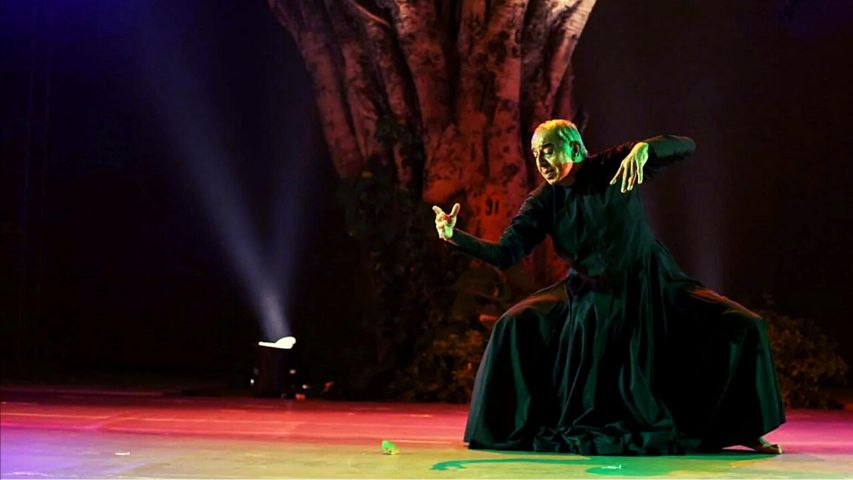
On a personal note. Who is the special person who lights up your life?!
No comments J
Here is wishing Hidayat’s play script reaches Mr Amitabh Bachchan and the erstwhile actor, originally from stage, returns to stage. And wishing many more lights to shine on Hidayat’s creativity.




-173X130.jpg)
-173X130.jpg)

-173X130.jpg)
-173X130.jpg)
-173X130.jpg)
-173X130.jpg)
-173X130.jpg)